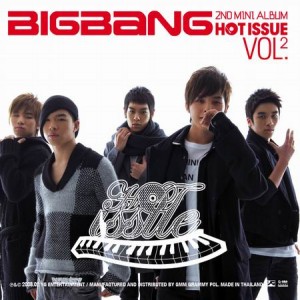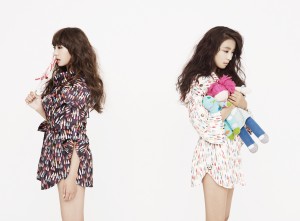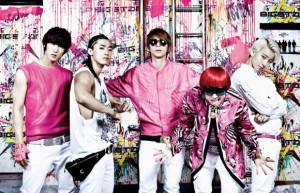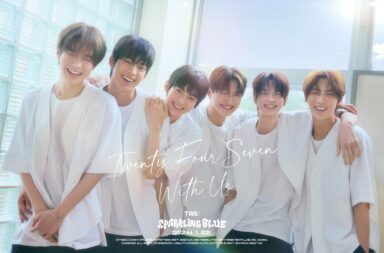 For those who’ve heard at least a half dozen K-pop songs in their lifetime and most likely happened to stumble upon the audio signatures “Brave,” “Brave Sound,” or “Brave New Sound” at the beginning of a track, one must at least be curious about knowing who this narcissistic producer is, he who feels the compulsive need to put his name on everything. He is Kang Dong Cheol, otherwise known as the man with the plural name, Brave Brothers. Yes, he is one man with a plural in his name (and yes, my spell check is definitely reminding me of that fact), and he is also the founder of his own record company, Brave Entertainment. Through his shameless self-promoting in almost every track he produces, he has become K-pop’s most renowned freelance hit-maker, second only to Shinsadong Tiger (in quality but definitely not in quantity).
For those who’ve heard at least a half dozen K-pop songs in their lifetime and most likely happened to stumble upon the audio signatures “Brave,” “Brave Sound,” or “Brave New Sound” at the beginning of a track, one must at least be curious about knowing who this narcissistic producer is, he who feels the compulsive need to put his name on everything. He is Kang Dong Cheol, otherwise known as the man with the plural name, Brave Brothers. Yes, he is one man with a plural in his name (and yes, my spell check is definitely reminding me of that fact), and he is also the founder of his own record company, Brave Entertainment. Through his shameless self-promoting in almost every track he produces, he has become K-pop’s most renowned freelance hit-maker, second only to Shinsadong Tiger (in quality but definitely not in quantity).
Brave Brothers began his career as an in-house producer with YG Entertainment for seven years, producing tracks for the likes of Lexy, Se7en, Gummy, and Big Bang. He worked extensively with Big Bang upon their debut, and his songs were largely featured on the b-sides of their earlier albums. His major breakthrough came in 2007 when he produced Big Bang’s two monster hits, “Lies” and “Last Farewell.” While Big Bang would ride the success of these two songs into becoming one of the biggest act in K-pop, Brave Brothers departed from YG shortly after, citing exhaustion, and started Brave Entertainment, also known as Brave Sound.
 One of the biggest critiques of Brave Brothers is that he has pigeon-holed his music by replicating his past hits over and over for different artists. As a matter of fact, it’s become rather easy to anticipate what a Brave Sound production sounds like. Brave Brothers has basically taken the formula he used with “Lies” and “Last Farewell,” and has rehashed it, remixed it, and regurgitated it with many of his hit songs. As a result, most of the songs he’s created for other artists become hits because he continuously follows his tried and true formula for hit-making. However, his success as a freelance producer have yet to reach the pinnacle that was “Lies” and “Last Farewell” due to its lack of musical progression and growth.
One of the biggest critiques of Brave Brothers is that he has pigeon-holed his music by replicating his past hits over and over for different artists. As a matter of fact, it’s become rather easy to anticipate what a Brave Sound production sounds like. Brave Brothers has basically taken the formula he used with “Lies” and “Last Farewell,” and has rehashed it, remixed it, and regurgitated it with many of his hit songs. As a result, most of the songs he’s created for other artists become hits because he continuously follows his tried and true formula for hit-making. However, his success as a freelance producer have yet to reach the pinnacle that was “Lies” and “Last Farewell” due to its lack of musical progression and growth.
Shortly after starting his own label in 2008, Brave Brothers began his work with then rookie group and aegyo boy band, U-Kiss. Their initial releases with Brave Brothers featured a light pop sound with R&B undertones that suited their initial flower boy image. The songs flopped on the charts and the group returned with a darker image and sound. Their next three promoted collaborations, “Man Man Ha Ni,” “Binguel Binguel,” and “Shut Up!” drew them some notoriety as they conformed heavily to the electro and autotune heavy productions that were being popularized at the time by Super Junior. As he was still in the process of developing his signature sound, Brave Brothers realized through his work with U-Kiss that the industry’s growing demand for an electro-heavy upbeat sound played heavily to his forte.
[youtube http://www.youtube.com/watch?v=eNWr4qixDSY&w=600&h=360] The industry’s demand for fierce and sexy girl groups also played into his hands. Brave Brothers found the stylistic sound he is known for through his work with female artists. First, he helped Brown Eyed Girls transition into an electro dance group with their comeback hit, “How Come” (which paved the way for their mega dance track, “Abracadabra”). He then adapted his trademark dance track which he perfected in “Last Farewell” and combined it with the fierce and sexy concept of After School to create their successful debut single, “AH.” Followed by the spunky and sultry hit that was “Diva,” Brave Brothers and After School went in a different direction with “Because of You.” Enthralled with his signature soft and mesmerizing piano melody that was characteristic of “Lies,” “Because of You” brought out a more mature and sentimental side of After School that paired very well with their sexy and feminine side. In fact, some are convinced that “Because of You” is still After School’s best song to date. Brave Brothers also produced fellow Pledis artist Son Dam-bi’s “Saturday Night,” which along with “Because of You” went on to topple the charts and achieve wins on music programs. Brave Brothers discovered that his electro-heavy dance hits meshed well with the sexy girl groups that were beginning to emerge by the dozens.
The industry’s demand for fierce and sexy girl groups also played into his hands. Brave Brothers found the stylistic sound he is known for through his work with female artists. First, he helped Brown Eyed Girls transition into an electro dance group with their comeback hit, “How Come” (which paved the way for their mega dance track, “Abracadabra”). He then adapted his trademark dance track which he perfected in “Last Farewell” and combined it with the fierce and sexy concept of After School to create their successful debut single, “AH.” Followed by the spunky and sultry hit that was “Diva,” Brave Brothers and After School went in a different direction with “Because of You.” Enthralled with his signature soft and mesmerizing piano melody that was characteristic of “Lies,” “Because of You” brought out a more mature and sentimental side of After School that paired very well with their sexy and feminine side. In fact, some are convinced that “Because of You” is still After School’s best song to date. Brave Brothers also produced fellow Pledis artist Son Dam-bi’s “Saturday Night,” which along with “Because of You” went on to topple the charts and achieve wins on music programs. Brave Brothers discovered that his electro-heavy dance hits meshed well with the sexy girl groups that were beginning to emerge by the dozens.
 One of the girl groups that emerged were the mighty Sistar, whose name has almost become synonymous with Brave Sound despite being from a different label. Brave Brothers’ catchy dance tracks intermingled with Sistar’s sexy, energetic, and attention-grabbing dance moves proved to be a highly lethal viable combination. The pair combined for a total of six hit songs, four of which garnered long runs near the top of the charts and much music program hardware. Nevertheless, criticism ensued of how Sistar’s tracks sounded too similar because they all featured the trademark beats of Brave Sound. While this may be true, their partnership brought Sistar well into the spotlight and established Brave Sound as a name many artists wished to put on their tracks.
One of the girl groups that emerged were the mighty Sistar, whose name has almost become synonymous with Brave Sound despite being from a different label. Brave Brothers’ catchy dance tracks intermingled with Sistar’s sexy, energetic, and attention-grabbing dance moves proved to be a highly lethal viable combination. The pair combined for a total of six hit songs, four of which garnered long runs near the top of the charts and much music program hardware. Nevertheless, criticism ensued of how Sistar’s tracks sounded too similar because they all featured the trademark beats of Brave Sound. While this may be true, their partnership brought Sistar well into the spotlight and established Brave Sound as a name many artists wished to put on their tracks.
As mentioned previously, the name Brave Sound has become restricted analogous to a specific type of sound. To put it simply, a Brave Sound production can be broken into three categories. The most outstanding formula is the upbeat dance track that is intended for the likes of sexy, fierce, and beastly concepts. With this, one can expect a catchy synth or piano melody merged with a heavy electro beat that builds up in the verse, and is followed by a stunning drop in the chorus that goes very well with the sharp vocals and stunning dance moves of a group — like Teen Top:
[youtube http://www.youtube.com/watch?v=18cInMYLEXw&w=600&h=360]The second type of production one can expect from Brave Sound is a more sentimental sound that relies heavily on the uplifting melody for its emotional sentiment. The electro beats play their part in the buildup of the song but are turned down a notch as the focus is on the gentle beat created by the smooth synth or piano melody. This formula works better for groups with light, cutesy images such as C-REAL or Boyfriend:
[youtube http://www.youtube.com/watch?v=zd5GGvWWnzU&w=600&h=360]The third type of Brave Sound production is a compromise between the first two. Whereas the former relies more on the heavy electro beat to emphasize the fierce dancing and the latter puts emphasis on the enchanting melody for its sentimental appeal, this third formula combines the best of both worlds in creating a sound that is both uplifting and enjoyable to dance to. This type of sound appeals to the more sexy and beastly groups who are looking to show off a classier and more sophisticated side, such as Teen Top, Rania, and After School:
[youtube http://www.youtube.com/watch?v=8TybPXqzQ50&w=600&h=360] Following in the limelight of industry senior Park Jin-young, Brave Brothers also manages the groups under his record label and finds time to release music as a solo artist. Since its inception, three acts have formed under Brave Entertainment: Electroboyz, Brave Girls, and the recently debuted Big Star. Although they benefit from the incredible hype of being associated with a big time producer, none of them have met the success of many of the groups Brave Brothers has produced for. Brave Girls did win “Rookie of the Year” at the Korean Culture and Entertainment Awards and realized some success on the charts, albeit due to questionable practices. There is much hype currently associated with Big Star for the level of competition their members endured in order to make the group. Brave Brothers’ expectations for the group are very high, even to the point of claiming that they will escalate Brave Entertainment into the company of the big three within the next three years. The man’s ambition is clearly as loud as his audio signatures.
Following in the limelight of industry senior Park Jin-young, Brave Brothers also manages the groups under his record label and finds time to release music as a solo artist. Since its inception, three acts have formed under Brave Entertainment: Electroboyz, Brave Girls, and the recently debuted Big Star. Although they benefit from the incredible hype of being associated with a big time producer, none of them have met the success of many of the groups Brave Brothers has produced for. Brave Girls did win “Rookie of the Year” at the Korean Culture and Entertainment Awards and realized some success on the charts, albeit due to questionable practices. There is much hype currently associated with Big Star for the level of competition their members endured in order to make the group. Brave Brothers’ expectations for the group are very high, even to the point of claiming that they will escalate Brave Entertainment into the company of the big three within the next three years. The man’s ambition is clearly as loud as his audio signatures.
As for his work as a solo artist who primarily raps, he is less predictable but sticks roughly to the same formulas. Having released two mini-albums and a solo album, Brave Brothers flexes his industry muscle by featuring a wide collection of artists to accompany him on his tracks. While he hasn’t quite made a name for himself with his raps, he has made quite a buzz as someone who can produce a decent collaboration track. Out of his discography as an artist, my favorite song is this sentimental track featuring Jay Park, off of his album, The Classic:
[youtube http://www.youtube.com/watch?v=aIxEvMEvslE&w=600&h=360]In response to his critics, Brave Brothers claims that the reason he’s made so many of his hits conform to one particular type of sound is because he simply caters to the demands of the industry. In return, the industry holds him in very high regard and keeps him in very high demand. He’s won in the category of “Hallyu Composer” at the Korean Culture Entertainment Daesang Awards. Son Dam-bi is set to make her long-awaited comeback by giving Brave Brothers another go and Hyuna has abandoned Shinsadong Tiger to give Brave Sound a try. What do you expect out of Brave Brothers in the future: something new, more of the same, or wish he would just drop the annoying self-admiring audio signatures? And most importantly, what are your favorite tracks from the man behind Brave Sound?
(ukissloveli, officialBEG, starshipTV, LOENENT, Nate, AznSamManTV, Naver, YG Entertainment, Pledis Entertainment, Starship Entertainment, Brave Entertainment)

